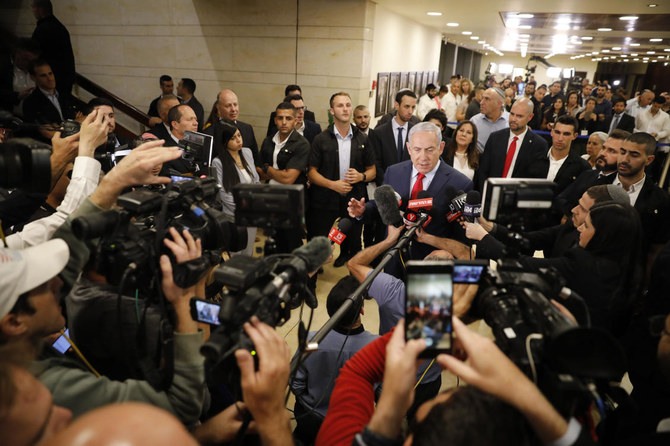JERUSALEM: Israel embarked Thursday on an unprecedented snap election campaign — the second this year — after Prime Minister Benjamin Netanyahu failed to form a governing coalition and instead dissolved parliament.
In what seemed an improbable scenario just days ago, Israel’s newly elected Knesset dissolved itself in an early morning 74-45 vote and set a new election date for September 17.
The developments were a shocking setback for Netanyahu, who had appeared to secure a comfortable win in last month’s election. But he was unable to build a parliamentary majority needed to rule because a traditional ally, Avigdor Lieberman, refused to bring his Yisrael Beiteinu faction into the coalition.
Netanyahu, who has led Israel for the past decade, now faces another challenge to his lengthy rule. It comes as he prepares for a pre-indictment hearing before expected criminal charges against him in a series of corruption cases.
Assuming they would sweep into power again, Netanyahu’s allies in the ruling Likud Party had already begun drafting a contentious bill aimed at granting him immunity from the various corruption charges awaiting him. He was also looking to push legislation limiting the power of Israel’s Supreme Court and paving his path to many more years in office.
But it was a separate issue that sparked the unprecedented crisis, and for the first time in history thrust Israel into a repeat election before a new government was even formed.
Lieberman — a veteran nationalist and secular politician — demanded that current legislation mandating that young ultra-Orthodox men be drafted into the military run its course.
Years of exemptions for ultra-Orthodox men have generated widespread resentment among the rest of Jewish Israelis who serve. The ultra-Orthodox, backed by Netanyahu, refused to bend and the showdown quickly devolved into a full-blown crisis that imploded the perspective government.
“The public chose me, and Lieberman, unfortunately, deceived his voters. From the beginning he had no intention to do what he said,” Netanyahu said after the vote, accusing Lieberman of aligning with “the left.”
Lieberman, a former top aide to Netanyahu who has alternated between a close alliance and bitter rivalry with his former boss, retorted that the new election was a result of Netanyahu caving into the ultra-Orthodox.
“This is a complete surrender of Likud to the ultra-Orthodox,” he said.
A new election complicates Netanyahu’s efforts to pass the proposed bills to protect himself from prosecution.
Even if Netanyahu wins the election, it is unlikely he will be able to form a government and lock down the required political support for an immunity deal before an expected indictment. That would force him to stand trial, and in turn put heavy pressure on him to step aside. No one in Likud has yet challenged him publicly.
The US State Department said on Thursday that the US-led conference on economic aspects of a Middle East peace plan will go ahead next month in Bahrain despite Israel’s snap elections, .
“We are not anticipating any changes. It’s set for June 25 and 26,” State Department spokeswoman Morgan Ortagus told reporters.
Another US official, speaking on condition of anonymity, said that a separate rollout of the political elements of the plan would take place “when the timing is right.”
Jared Kushner, President Donald Trump’s son-in-law and adviser, had been preparing for months to unveil the peace plan but had said he was waiting for Israel’s elections in April as well as the end of the Islamic holy month of Ramadan.
The Bahrain conference is expected to look at economic opportunities for the Palestinians, through funding from Washington’s allies that are united with Israel and the United States in opposing Iran.
Kushner has hinted that the United States in turn will not push for the creation of a Palestinian state, a key goal of decades of US-led diplomacy, and Netanyahu during his last campaign threatened to annex parts of the West Bank.
The Palestinian Authority has already said it will boycott the Bahrain conference, not seeing Trump as an honest broker after his landmark recognition of Jerusalem as Israel’s capital.
Israel faces new elections after parliament dissolves
Israel faces new elections after parliament dissolves

- Israel’s newly elected Knesset dissolved itself in an early morning 74-45 vote and set a new election date for September 17
- Benjamin Netanyahu, who has led Israel for the past decade, now faces another challenge to his lengthy rule
Israel’s defense chief threatens ceasefire collapse if Lebanese army not deployed south of Litani river

- Under the agreement, Hezbollah is supposed to move its fighters, weapons and infrastructure away
- Lebanese army soldiers and UN peacekeepers are to be the sole armed presence in southern Lebanon
Israel’s defense chief warned Sunday that the truce that ended more than a year of fighting with Lebanon’s Hezbollah is at risk.
During the first phase of the ceasefire, Hezbollah is supposed to move its fighters, weapons and infrastructure away from southern Lebanon north of the Litani River, while Israeli troops that invaded southern Lebanon need to withdraw all within 60 days.
Defense Minister Israel Katz said the agreement also requires Lebanese troops to eliminate any Hezbollah infrastructure in the buffer zone — “something that hasn’t happened yet.”
Lebanese army soldiers are to deploy in large numbers and alongside United Nations peacekeepers be the sole armed presence in southern Lebanon.
“If this condition is not met, there will be no agreement, and Israel will be forced to act on its own to ensure the safe return of the residents of (Israel’s) north to their homes,” he said.
Katz made the statement after Hezbollah’s current leader Naim Kassem warned in a televised address Saturday that its fighters could strike Israel if its troops don’t leave the south by the end of the month.
Top Hezbollah security official Wafiq Safa told a news conference Sunday that Lebanon's Parliament Speaker Nabih Berri, who negotiated the ceasefire deal with Washington, told Hezbollah that the government will meet with US envoy Amos Hochstein soon.
“And in light of what happens, then there will be a position,” said Safa.
Hochstein had led the shuttle diplomacy efforts to reach the fragile truce.
Erdogan expects support from Syria in Turkiye’s battle with PKK

- “The new administration in Syria is showing an extremely determined stance in preserving the country’s territorial integrity and unitary structure,” he said
ANKARA: Turkish President Tayyip Erdogan said on Sunday that Syria’s new leadership is determined to root out separatists there, as Ankara said its military had “neutralized” 32 members of the outlawed Kurdistan Workers Party, or PKK, in the country.
A rebellion by groups close to Turkiye ousted Syrian president Bashar Assad last month. Since then, Turkiye-backed Syrian forces have occasionally clashed in the north with U.S-backed Kurdish forces that Ankara deems terrorists.
“With the revolution in Syria... the hopes of the separatist terrorist organization hit a wall,” Erdogan told his party’s provincial congress in Trabzon.
“The new administration in Syria is showing an extremely determined stance in preserving the country’s territorial integrity and unitary structure,” he said.
“The end of the terrorist organization is near. There is no option left other than to surrender their weapons, abandon terrorism, and dissolve the organization. They will face Turkiye’s iron fist,” Erdogan added.
The defense ministry separately announced the armed forces’ operation in northern Syria that it said had “neutralized” — a term that usually means killed — the 32 PKK members. It said Turkiye’s military had also “neutralized” four PKK members in northern Iraq, where the militants are based.
Palestinian ministry says Israeli forces kill teenager in West Bank raid

- Palestinian official news agency Wafa reported that Madani was hit when Israeli forces fired bullets, flares and tear gas
NABLUS, Palestinian Territories: The Palestinian health ministry in the Israeli-occupied West Bank stated that Israeli forces had killed a teenager during a raid on a refugee camp near the city of Nablus Sunday.
Mutaz Ahmad Abdul Wahab Madani, 17, was “killed and two others were wounded by occupation forces’ gunfire during a raid near Askar Camp east of Nablus,” the Ramallah-based ministry said in a statement.
The Israeli military did not immediately comment.
Palestinian official news agency Wafa reported that Madani was hit when Israeli forces fired bullets, flares and tear gas.
Medics reported that Madani had been shot in the chest and that Israeli forces initially kept him with them before handing him to Palestinian medics.
He was then transported to Rafidia hospital in a critical condition but succumbed to his wounds, a medic said.
Violence in the West Bank has intensified since war broke out in the Gaza Strip after Hamas’s October 7, 2023 attack on Israel.
Since then, at least 818 Palestinians have been killed in the territory by Israeli troops or settlers, according to the health ministry.
In the same period, Palestinian attacks in the West Bank have killed at least 25 Israelis, according to official Israeli figures.
Israel has occupied the West Bank since conquering it in the 1967 Arab-Israeli war.
Hamas official says ready to free 34 Gaza hostages under mooted deal

- The office of Israeli Prime Minister Benjamin Netanyahu said Hamas has yet to provide a list of hostages to be released under an agreement
GAZA STRIP, Palestinian Territories: A Hamas official on Sunday said the Palestinian militants were ready to free 34 hostages in the “first phase” of a potential deal with Israel, after Israel said indirect talks on a truce and hostage release agreement had resumed in Qatar.
Mediators Qatar, Egypt and the United States have tried for months to strike a deal to end the war. The latest effort comes just days before Donald Trump takes office as president of the United States on January 20.
The talks took place as Israel pounded the Gaza Strip on Sunday, killing at least 23 people according to rescuers, nearly 15 months into the war.
During that time there has been only one truce, a one-week pause in November 2023 that saw 80 Israeli hostages freed along with 240 Palestinians from Israeli jails.
“Hamas has agreed to release 34 Israeli prisoners from a list presented by Israel as part of the first phase of a prisoner exchange deal,” the Hamas official said.
The office of Israeli Prime Minister Benjamin Netanyahu said Hamas has yet to provide a list of hostages to be released under an agreement.
The Hamas official, requesting anonymity as he was not authorized to discuss the ongoing negotiations with the media, said the initial swap would include all the women, children, elderly people and sick captives still held in Gaza.
He said some may be dead and that Hamas requires time to determine their condition.
“Hamas has agreed to release the 34 prisoners, whether alive or dead. However, the group needs a week of calm to communicate with the captors and identify those who are alive and those who are dead,” the official said.
During their attack on October 7, 2023 which began the Gaza war, militants seized 251 hostages, of whom 96 remain in Gaza. The Israeli military says 34 of those are dead.
Until the Hamas official’s comment there had been no update on the talks which both warring sides were to resume in Qatar over the weekend.
“Efforts are under way to free the hostages, notably the Israeli delegation which left yesterday (Friday) for negotiations in Qatar” Israeli Defense Minister Israel Katz told relatives of a hostage on Saturday, according to his office.
French Foreign Minister Jean-Noel Barrot, in an interview with RTL radio, said that “we continue to exert the necessary pressure” to reach a deal.
“Unfortunately, it doesn’t depend only on us.”
In December, Qatar expressed optimism that “momentum” was returning to the talks following Trump’s election victory.
But Hamas and Israel then traded accusations of imposing new conditions and obstacles.
In northern Gaza on Sunday, the Civil Defense agency said an air strike on a house in the Sheikh Radwan area killed at least 11 people.
Agency spokesman Mahmud Bassal said the victims included women and children, and rescuers were using their “bare hands” to search for five people still trapped under rubble.
The Israeli military said Sunday it had struck more than 100 “terror targets” in Gaza over the past two days, marking an apparent escalation in its assault.
The Hamas-run territory’s health ministry said a total of 88 people were killed over the previous 24 hours.
In one strike, five people died when the house of the Abu Jarbou family was struck in the Nuseirat refugee camp in central Gaza, rescuers said.
AFP footage from another strike, on Bureij camp near Nuseirat, showed rescuers transporting bodies and injured people to a hospital.
In one scene, a medic attempted to resuscitate a wounded man inside an ambulance, while another carried an injured child to the hospital.
Relatives cried over the bodies of two men wrapped in white shrouds, the images showed.
Several of the strikes targeted sites from which militants had been firing projectiles into Israel in recent days, the military said.
The military separately announced that its forced had killed a militant commander in close combat in northern Gaza last week.
It said the slain man was a member of militant group Islamic Jihad’s rocket array, and had participated in the October 7, 2023 attack.
Last week, Katz warned of intensified strikes if the incoming rocket fire continued.
Rocket fire had become less frequent as the war dragged on but has recently intensified, as Israel pressed a major land and air offensive in the territory’s north since early October.
Hamas’s October 2023 attack on Israel resulted in the deaths of 1,208 people, mostly civilians, according to official Israeli data.
Israel’s retaliatory military offensive has killed 45,805 people in Gaza, a majority of them civilians, according to figures from the territory’s health ministry which the United Nations considers reliable.
How decades of Assad regime interference left lingering scars on Lebanon’s political life

- While Bashar Assad’s downfall closes a dark chapter for Syria, his family’s legacy still looms large over Lebanese politics
- Maintaining control over Lebanon was critical for the regime, even if it came at the expense of the Palestinians, says historian
LONDON: After nearly half a century of Assad family rule in Syria, there is a glimmer of hope for neighboring Lebanon, which for decades endured military occupation, persistent interference in its political affairs, and a legacy of assassinations linked to the regime.
Bashar Assad, who succeeded his father Hafez in 2000, was overthrown on Dec. 8, marking the conclusion of a devastating 13-year civil war. His ousting is likely to have major implications for neighboring countries — few perhaps more so than Lebanon.
The Assad regime’s interest in Lebanon dates back to the period after the 1973 Arab-Israeli war, when it became part of Syria’s strategy to avoid being flanked by Israel through the Bekaa Valley, according to a 2005 paper by Bassel Salloukh of the Lebanese American University.

But Israel was not the only perceived existential threat. The late Hafez Assad, who seized power in 1970, “lived in constant fear of coup and conspiracy,” Syrian historian Sami Moubayed told Arab News. “Lebanon was where many of his worst threats had been based.”
These threats included Yasser Arafat’s Palestinian Liberation Organization, the Palestinian Fatah Movement, the Iraq-backed Fatah Revolutionary Command Council, and Assad’s comrade turned rival, Mohammad Umran, believed to have been killed by Syrian intelligence in 1972.
In addition, Iraqi dictator Saddam Hussein “invested heavily in Lebanon and would go on to support Michel Aoun’s War of Liberation against Syria during the last stage of the civil war,” Moubayed said.
As such, Moubayed said, Hafez “simply could not afford to lose Lebanon.”
“Due to its proximity with Syria and lax borders, anything could be smuggled to and from Lebanon; arms, spies, saboteurs, assassins, and revolutionary ideas,” he said. “If Lebanon fell to any of Assad’s abovementioned enemies, then his regime in Damascus would become endangered.”
Rooted in Assad’s paranoia, the regime’s involvement escalated and became more pronounced with the Syrian army’s intervention in the Lebanese civil war, eventually leading to a 29-year Syrian occupation of Lebanon.
In late spring 1976, a year into Lebanon’s 15-year civil war, Assad deployed troops to rescue the Maronite Christian militias under attack by the PLO and the Lebanese National Movement.
The National Movement coalition, formed in 1969 and dissolved in 1982, included leftist, pan-Arabist and pro-Syria groups. It was led by Druze leader Kamal Jumblatt, whose killing on March 16, 1977, is widely attributed to Assad’s brother Rifaat.
Assad’s alliance with the Maronite militias against the National Movement and the PLO might seem perplexing given the regime’s anti-Israel stance at the time. Indeed, Syria’s actions appeared to align with Israel’s main objectives in its 1982 invasion of Lebanon; destroying the PLO and installing a Maronite-led government.
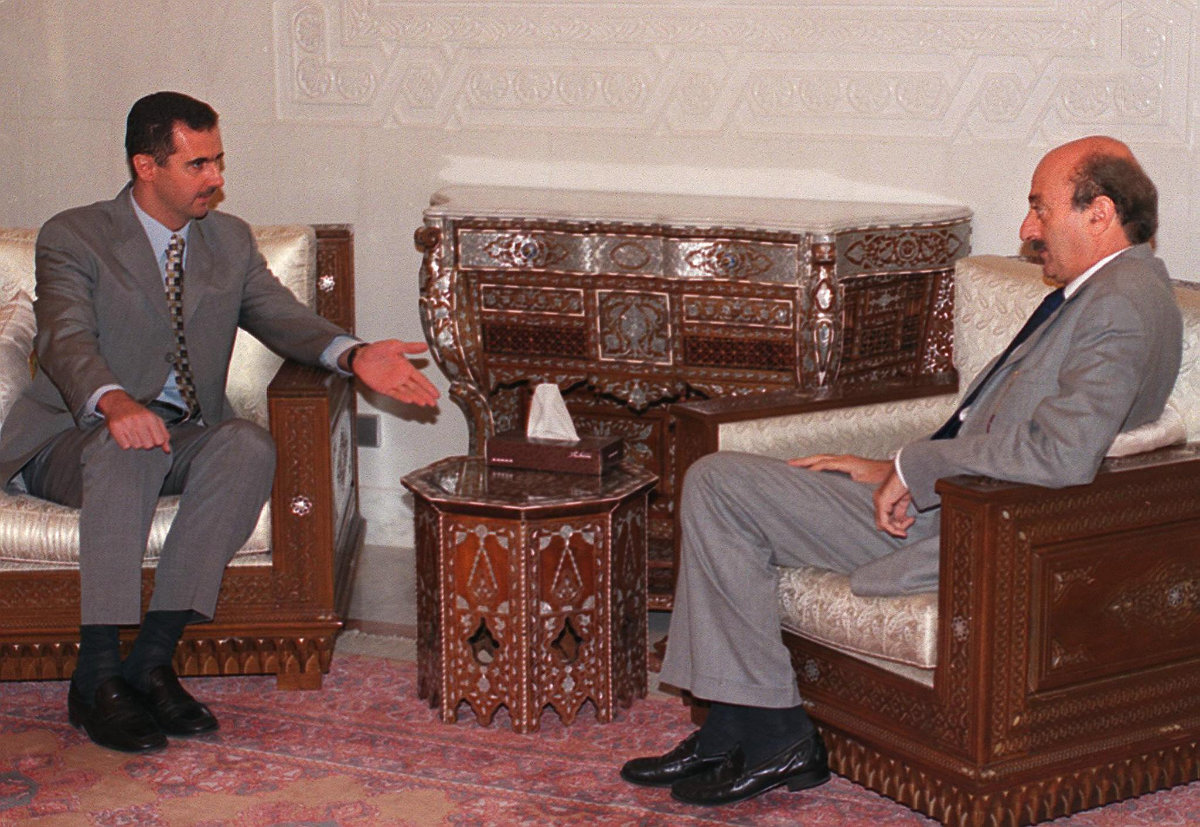
But Assad’s concerns about, and enmity toward, the National Movement had deep and complex roots, which ultimately led to his brief alliance with the Maronites.
“The National Alliance actually predates the Lebanese civil war, and so does Hafez Assad’s annoyance with it,” Moubayed said. “On paper, however, they ought to have been inseparable allies, given their mutual support for the Palestinians.
“There were many components in the National Alliance that Assad never liked, like Lebanese Baathists backed by Iraq and Kamal Jumblatt’s Progressive Socialist Party.”
Moubayed added: “The Lebanese civil war came at a time when Assad was in the midst of a major standoff with the Iraq Baath, which had a spillover into Lebanon.
“In mid-1975, and while the war was just starting to unfold in Lebanon, Iraq had mobilized its army and threatened to invade Syria (over water rights). Assad suspected that then Vice President Saddam Hussein would use the National Alliance to create trouble for Syria.”
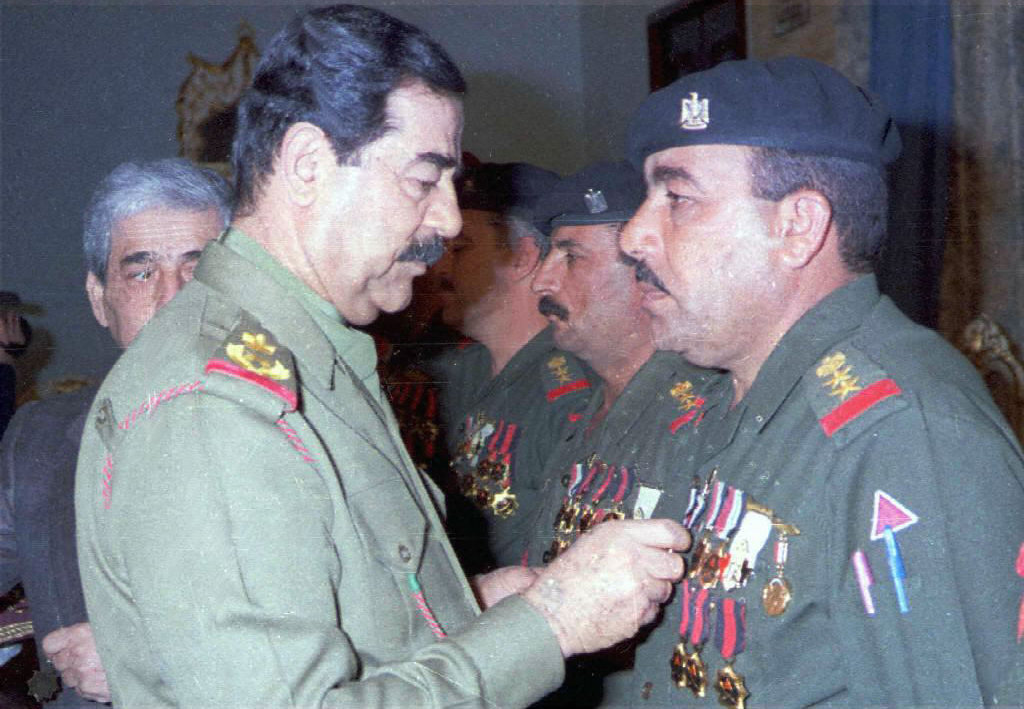
Moreover, according to Moubayed, the National Alliance’s relationship with Yasser Arafat was “troubling” for Assad, who feared a “Palestinian mini-state in Lebanon” could provoke Israeli intervention and allow Saddam Hussein “to corner him from both Iraq and Lebanon.”
“When Christian leaders came seeking his help to clip the wings of Arafat in Lebanon, Assad saw it as a lifetime opportunity to destroy Abu Ammar (Arafat).”
This may explain why Assad quickly turned against two Christian factions that defied Damascus by demanding its withdrawal and collaborating with Israel against a common Palestinian and Muslim enemy.
In the summer of 1978, Syria launched rockets and artillery at the East Beirut strongholds of two Christian factions, the Phalangists and followers of former President Camille Chamoun, The New York Times reported.
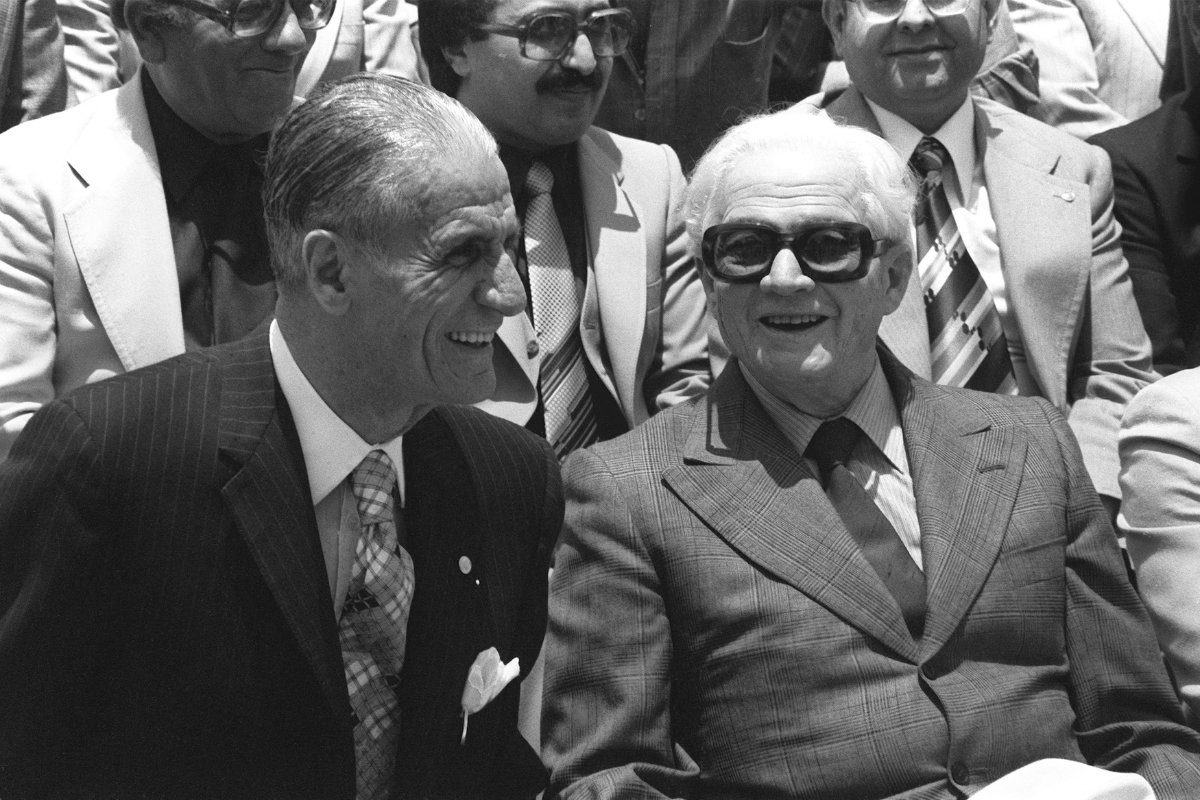
A third faction, led by former Lebanese President Suleiman K. Frangieh, broke with the others over their alliance with Israel.
Israel came to its Maronite allies’ rescue, then soon retreated, leaving behind a buffer zone controlled by the Southern Lebanon Army.
Fearing a similar alliance between the Lebanese Forces in Zahle, eastern Lebanon, and local allies that could threaten the Syrian army’s presence in the nearby Bekaa Valley, Assad cracked down on the LF. This led to the Battle of Zahle, which lasted from December 1980 to June 1981.
Israel invaded Lebanon again in 1982, capturing Beirut and forcing Syrian troops to retreat to the Bekaa Valley. The majority of the PLO, including its leader Arafat, were expelled on Aug. 30 that year as part of an international agreement to end the violence.
Meanwhile, Assad, who used the rhetoric of resistance against Israel to strengthen his rule, seized the opportunity to gain control of the Palestinian issue in Lebanon.
For Assad, Moubayed said, controlling Lebanon was “almost as important as controlling Syria itself, and if it came at the expense of the Palestinians, then this was a price he was willing to pay.”
In late 1982, Arafat’s stance was reportedly becoming more moderate toward Israel, and PLO dissidents in Lebanon’s northern city of Tripoli began organizing with Assad’s support.
Within a year, and after Arafat returned to Lebanon, the Battle of Tripoli erupted between pro-Syrian Palestinian militant factions and the PLO. Arafat accused Assad of orchestrating the rebellion against him among PLO forces in Lebanon.
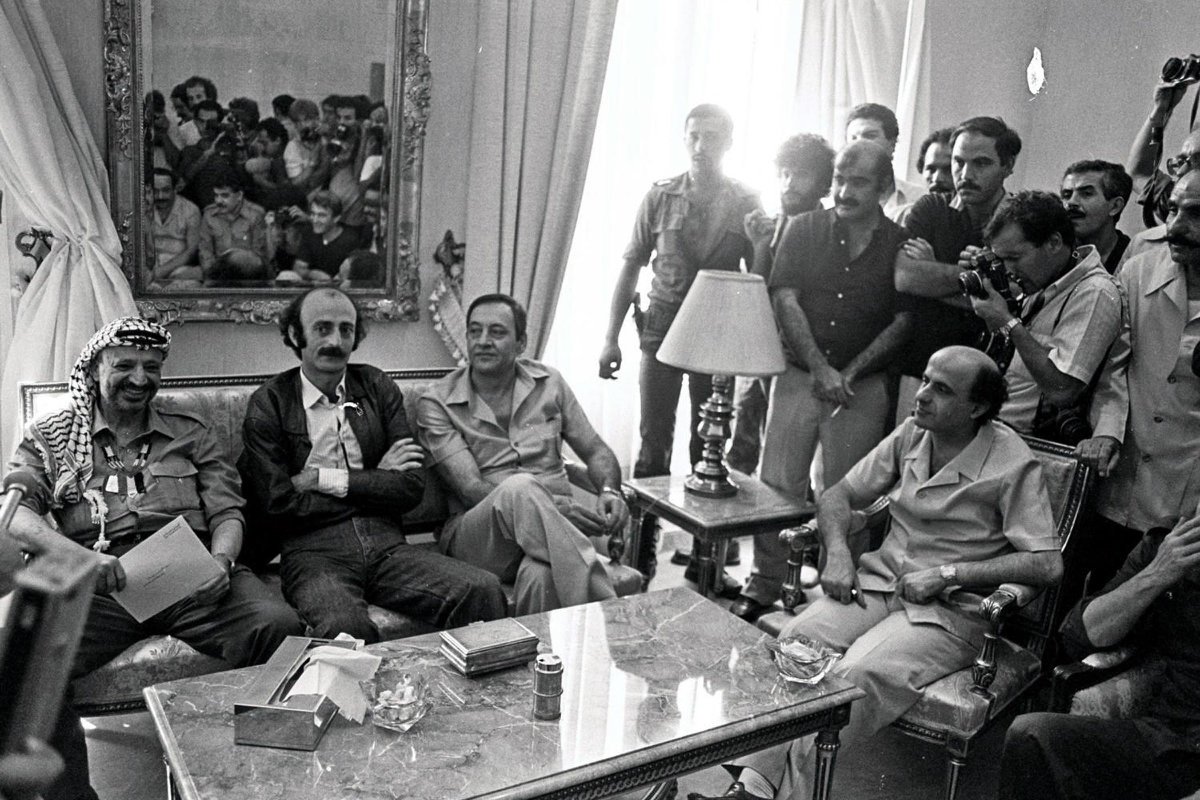
The conflict ended the PLO’s involvement in the Lebanese civil war.
“For Assad, it was as much about controlling the Palestinian issue as it was about controlling Lebanon,” Lebanese economist and political adviser Nadim Shehadi told Arab News. “Control of Lebanon gave Assad leverage over the resolution of the Palestinian-Israeli conflict. He held the cards and controlled the camps.
“After Israel’s withdrawal in 1983 and the departure of the PLO, Syria systematically took control of PLO assets and organizations. Every party (in Lebanon) saw this, even the Kataeb (Phalangist) Party.
“In each institution, pro-Fatah/PLO members were replaced by pro-Syrian ones,” he added, highlighting that this had culminated in the War of the Camps, the War of Brothers, and the takeover of Ras Beirut by the Amal Movement and pro-Syrian factions.
Having influence over the resolution of the Palestinian-Israeli conflict means that “Assad would hold the key variables, and no peace process would succeed without his conditions, approval, or the right price being extracted,” Shehadi said.
“It gives him power over the region. This was demonstrated by the privileges he received in Lebanon through the Taif Agreement and the concessions made for Syria’s participation in the Gulf War coalition to expel Saddam from Kuwait.
“In a nutshell, it gives him veto power and blocking power.”
The Taif Accord, negotiated in Saudi Arabia in September 1989 and approved by Lebanon’s Parliament in November 1989, ended the civil war in 1990. While it called for the withdrawal of all foreign troops, it allowed Assad to impose a de facto protectorate over Lebanon and its political life.
Between 1991 and 2005, the Assad regime had total control over Lebanon’s domestic and foreign policies. It capitalized on the leeway it was given, skillfully balancing relations between Lebanon’s many sects and factions and playing a key role in fueling many of the tensions that persist today.
The Assads’ involvement in Lebanon was marked by a series of attacks that killed or wounded many anti-Syrian journalists and politicians. In 2005, during Bashar Assad’s reign, the wave of killings intensified. Under international pressure, the last Syrian soldiers withdrew from Lebanon on April 26 that year.
In 2005 alone, at least six anti-Syrian Lebanese figures were assassinated, including former Prime Minister Rafik Hariri, who was killed in a car bombing. His death, along with 21 others, was investigated by a UN-backed tribunal, which found no evidence linking Hezbollah’s leadership or Syria to the attack.

However, the assassination occurred as Hariri and his political allies were debating whether to call for Syria’s withdrawal of forces from Lebanon, the AP news agency reported.
The 2005 attacks on prominent anti-Syria figures also targeted journalists who were vocal in criticizing Assad’s policies in Lebanon, including history professor Samir Kassir; former MP Gebran Tueni, the editor and publisher of Annahar newspaper; and TV anchor May Chidiac, who survived an assassination attempt but lost an arm and a leg.
Throughout their rule, both Hafez and Bashar Assad were notorious for maintaining tight control over the media, a practice that became especially evident during Syria’s civil war, which began in 2011. Although less pronounced, this strategy also extended to Lebanon during their reign.
The withdrawal of Syrian troops from Lebanon, nonetheless, did not end Assad’s influence over political life in Lebanon.
Opinion
This section contains relevant reference points, placed in (Opinion field)
In a speech announcing the move, Bashar Assad said: “Syria’s withdrawal from Lebanon does not mean the absence of a Syrian role. This role is governed by many geographic and political and other factors. On the contrary, we (will be) more at liberty and more forthcoming in our dealings with Lebanon.”
Through strategic political and military alliances, including with the Iran-backed Hezbollah and the Amal Movement, and under the guise of resistance against Israel, the Assad regime maintained significant influence over Lebanon’s domestic and foreign policies.
In 2011, Lebanon found itself with a mainly pro-Syrian cabinet. The formation of this government came months after the eruption of anti-regime protests in Syria, making it critical for Assad to secure a friendly cabinet in Beirut.

Although Assad’s demise signals a potential turning point for Lebanon as it approaches a long-awaited conclusion to its presidential election — ongoing since 2022 and potentially concluding on Jan. 9 — decades of Assad interference still loom large over Lebanese politics.
The Syrian regime “cloned itself in Lebanon” by penetrating “every institution and political party, including ministries, the army, the security services and even religious organizations,” Shehadi wrote in a recent op-ed for Arab News.
“Syria also facilitated the creation of Hezbollah, sponsored by its ally Iran, and balanced it out with Prime Minister Rafik Hariri.”
And despite Hezbollah being weakened by its recent war with Israel and the waning of Iran’s regional influence since Assad’s downfall, Shehadi predicts “a crisis over the formation of the Cabinet and the ministerial declaration following the election of a president.”
He told Arab News: “The main variable here would be whether the Amal Movement can act independently of Hezbollah. I personally doubt it can, or that (Parliament Speaker) Nabih Berri would take the risk.
“The ministerial declaration upon the formation of the new government will have to address Hezbollah’s arms and the army’s prerogatives to take over and prevent rearming in south Lebanon.”
It will also “have to reference (UN Security Council) Resolutions 1559,” which calls for the disbanding and disarmament of all militias in Lebanon. “Hezbollah will try to block this, and it will take a long time to find a suitable language that satisfies all parties.”
Although the Assads are gone, their legacy is likely to linger. “For over 50 years, the Assad regime flourished by creating problems for its neighbors,” Shehadi said. “It will not be missed.”



